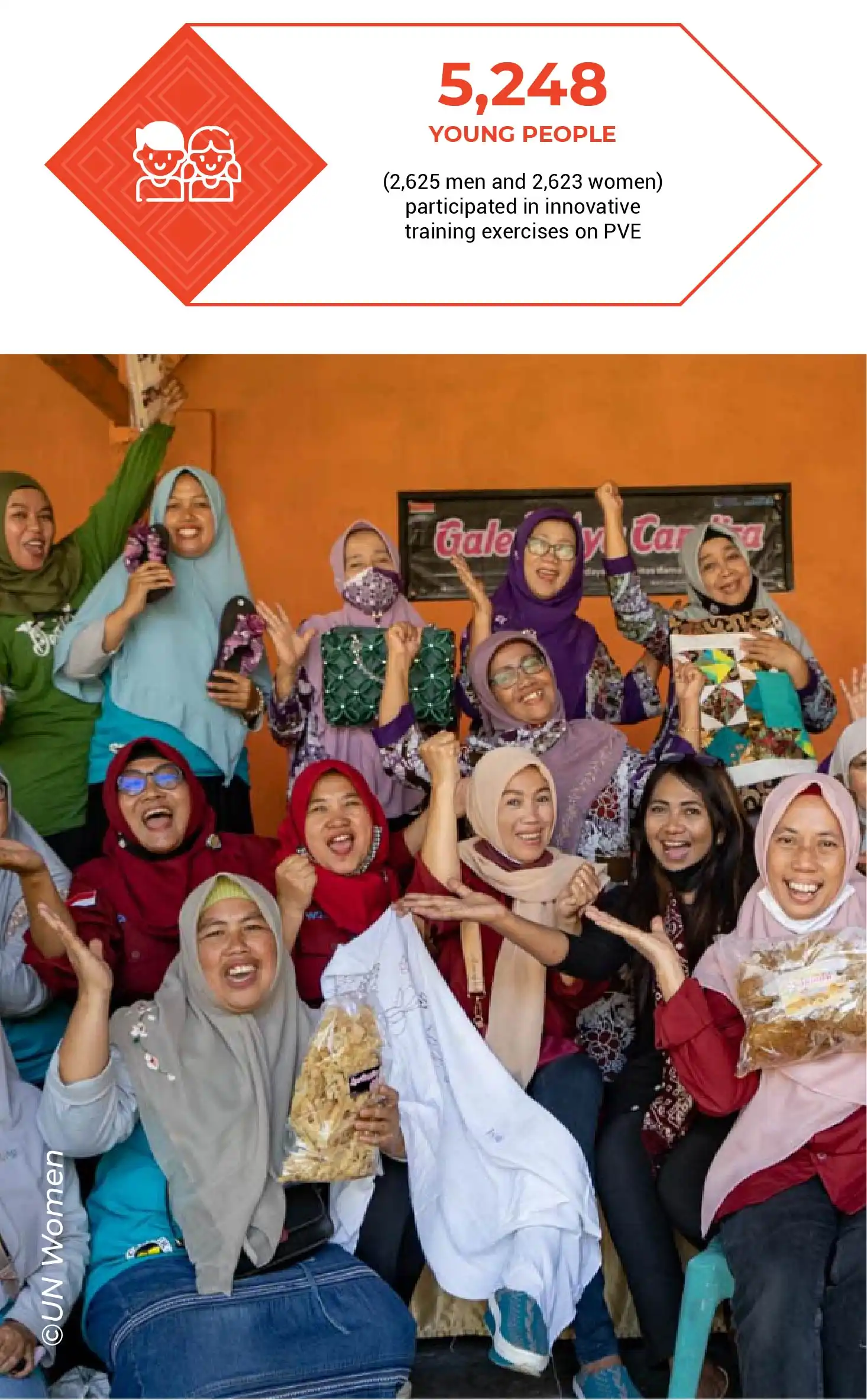United Nations In Indonesia
Country Results Report 2021
Building Community Resilience and Ensuring a Gender Responsive Approach to Preventing Violent Extremism
 Collectively, the three UN projects Guyub, Convey and Protect reached more than 13 million beneficiaries with their PVE interventions in 2021, exceeding the target set for the year. All three projects are designed to empower communities—including youth, women, religious leaders, and educational actors—to prevent violent extremism in innovative ways. These programs also contributed to the development of a National Action Plan for PCVE in Indonesia, which was enacted through a Presidential Regulation in early 2022.
Collectively, the three UN projects Guyub, Convey and Protect reached more than 13 million beneficiaries with their PVE interventions in 2021, exceeding the target set for the year. All three projects are designed to empower communities—including youth, women, religious leaders, and educational actors—to prevent violent extremism in innovative ways. These programs also contributed to the development of a National Action Plan for PCVE in Indonesia, which was enacted through a Presidential Regulation in early 2022.
Under Guyub, the UN continued to work with civil society partner the Wahid Foundation to expand the reach of its Peace Villages initiative, which grew in number from 10 at the start of 2021 to 16 by year’s end, impacting about half a million people.
In 2021 phase three of a Peace Village initiative called WISE (Women’s Participation for Inclusive Society) promoted values, such as inclusivity, education, economic empowerment, and equitable justice, that undermine the message of violent extremism and strengthen the ability of grassroots women’s movements to promote gender justice, which has been negatively impacted by COVID-19.
The project consolidated, sustained, and deepened prevention and response mechanisms, such as women’s role in early warning, community mediation of conflicts, and women’s participation in decision making, to advance gender equality and maintain peace. The Peace Village action plan drew support from the Ministry of Villages, provincial and local governments, and stakeholders including village heads, local religious leaders, and faith-based organisations.
Police are often at the forefront of promoting human security at the community level. Through the Guyub Project, the UN developed and conducted a series of training for 320 police officers on community engagement, in collaboration with the Jakarta Center for Law Enforcement Cooperation (JCLEC). The training program—which drew on focused inputs from academia, Indonesia’s National Counterterrorism Agency, and law enforcement units such as Special Detachment 88—is now integrated into JCLEC’s main curriculum for community police officer training, ensuring its continuity after the Guyub Project concludes in April 2022. Some 98 of the law enforcement actors that participated, including 36 women, were engaged in analysing community needs and delivering PPE in response to Indonesia’s summer outbreak, further deepening their ties with the communities they police.
Delays to the placement of prospective Indonesian migrant workers and more isolated working conditions abroad due to COVID-19 worsened social inequalities and put migrant workers at greater risk of exposure to online radicalism in 2021. In response, the UN, and the Indonesian Migrant Workers Protection Board (BP2MI) co-organized a national online seminar on the prevention of radicalism and intolerance, designed for government officials who serve for the protection of migrant workers. With UN support, BP2MI also updated pre-departure orientation modules for migrant workers to include material to counter intolerance and build resilience to extremist propaganda.
That was just one of a range of UN-backed interventions targeting disinformation. Another targeted interfaith leaders who participated in a training program coordinated between Guyub and the Centre for the Study of Islam and Democracy. Of those, 83% reported that they had a better understanding of misinformation and most felt capable of analysing dangerous narratives to design counter-narratives. The UN also measured cognitive and attitude changes among students who participated in a related training programme, with 77% of students surveyed in Jember province, 75% in Surabaya, 83% in Malang, and 50% in Lamongan agreeing that it increased their skills in preventing violent extremism.
Furthermore, the UN’s Convey Project helped the Ministry of Religious Affairs develop its Roadmap to Religious Moderation through various policy engagements. The project supported the establishment of early warning systems against harmful misinformation in eight high schools in the city of Tangerang-Banten and at four state Islamic universities nationwide.